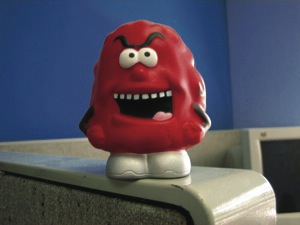san diego
‘The Doctor is In’
Urban Mo’s hosts syphilis testing party
Published Thursday, 15-Apr-2010 in issue 1164
Family Health Centers of San Diego and the County of San Diego are teaming up to host a syphilis testing event called “The Doctor is In,” at Urban Mo’s on Saturday, April 24, starting at 3 p.m.
“The purpose of the event is to kick off the “We All Test” campaign to encourage people to make testing a regular and routine part of their lives by bringing attention to the alarming increase in syphilis among gay men in San Diego,” said Bob Lewis, Director of HIV Services at Family Health Centers of San Diego.
According to the “We All Test” campaign, in 2009, a gay man was diagnosed with syphilis almost daily.
Through the campaign, Family Health Centers and the County of San Diego are attempting to identify new cases of syphilis among gay men while raising awareness of the need for frequent syphilis testing if risk exists.
“It wouldn’t surprise anyone if a few shirts got discarded at some point in the evening,” Lewis said, noting this event will be fun with a serious purpose.
The event is free, open to the public and promises raffle prizes, a bachelor auction and drink specials.
The bachelors set for the auction are comprised of volunteers from Family Health Centers and supporters of the organization.
“The best way someone can participate is to attend the event and ‘bid on’ one of the great guys who have already volunteered,” Lewis said, noting proceeds from the event benefit the Gay Men’s Health Clinic and transgender clients of Family Health Centers of San Diego.
The “We All Test” campaign is a result of the rapid increase in the number of syphilis cases among men who have sex with men in San Diego. Since 2000, syphilis cases among gay men increased 1,100 percent.
One reason for the significant increase may be because many people are untreated for syphilis or are misdiagnosed, which can lead to a fatal outcome.
“A person can have syphilis and not show any symptoms, sometimes for years,” Lewis said. “Untreated syphilis can lead to serious illness, including paralysis and dementia, or even death.”
In a Public Service Announcement for the “We All Test” campaign, community members, including “Big Mike” Phillips, urged gay men to get tested for the infection.
“Together we can help identify and eliminate this problem,” Phillips said. “If we don’t know about it, how can we control it?”
Phillips also encouraged discussion regarding syphilis.
“We should talk about it as a community, with people we love and people we have sex with,” Phillips said. “You don’t have to have syphilis to talk about it.”
Harold, another community member, discussed how syphilis can affect someone living with HIV/AIDS.
“Being HIV-positive doesn’t just stop with taking HIV meds, it involves being healthy all around” Harold said. “Syphilis is one of those concerns I have. If I have syphilis, that’s going to affect my HIV as well.”
In San Diego, approximately 55-60 percent of gay male cases of syphilis are co-infected with HIV.
According to the Centers for Disease Control, genital sores caused by syphilis make it easier to transmit and acquire HIV infection. There is an estimated two- to five-fold increased risk of acquiring HIV if exposed to that infection when syphilis is present.
In addition to “The Doctor is In,” Family Health Centers offers testing reminders via text message and e-mail, as well as testing at the Gay Men’s Clinic on Tuesday nights starting at 5:30 p.m. in North Park.
Urban Mo’s is located at 308 University Ave. in Hillcrest. For more information on “The Doctor is In” or to sign up for syphilis testing reminders, visit www.wealltest.com. To schedule an appointment with Family Health Centers, call 619-515-2449.
Syphilis, known as “the great imitator,” is sometimes misdiagnosed because its signs and symptoms are similar to other diseases. When a person is first infected and in the primary stage of syphilis, a painless ulcer emerges at the site of the infection, often looking like a herpes sore, called a chancre. It can be in the throat, mouth, rectum, penis or vagina. Without treatment, the chancre goes away after a couple of weeks and is followed by a rash on the palm of the hands, soles of the feet or trunk of the body. This is known as secondary syphilis.
The rash often disappears in a few weeks and people often mistake it for an allergic reaction to detergent or soap.
Once the chancre and rash clear, the virus usually lies dormant for years, but it continues to take its toll on the human body.
If left untreated, syphilis bacteria can severely damage the body’s organs as it travels throughout the body. The final stage, called latent syphilis, can result in mental illness, blindness, other neurological problems, heart disease and death.
According to doctors, syphilis develops much more rapidly in HIV-positive people, sometimes with both the first and second stages occurring at the same time.
Depending on the stage of infection, syphilis can often be treated with a series of bicillen shots.
|
|
Copyright © 2003-2025 Uptown Publications


